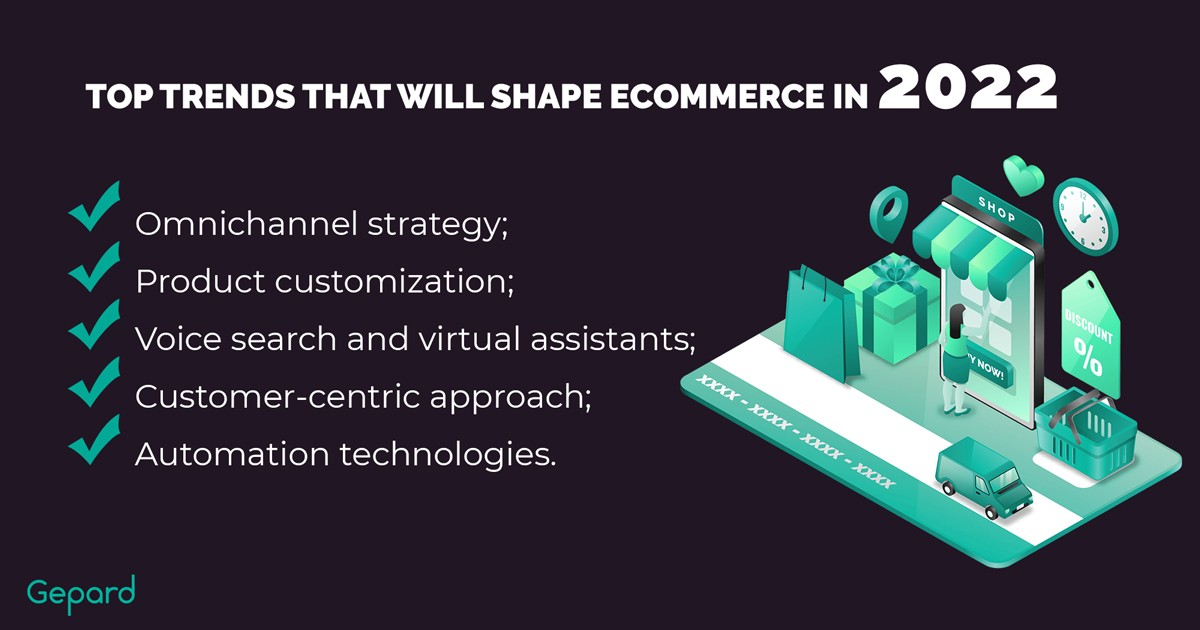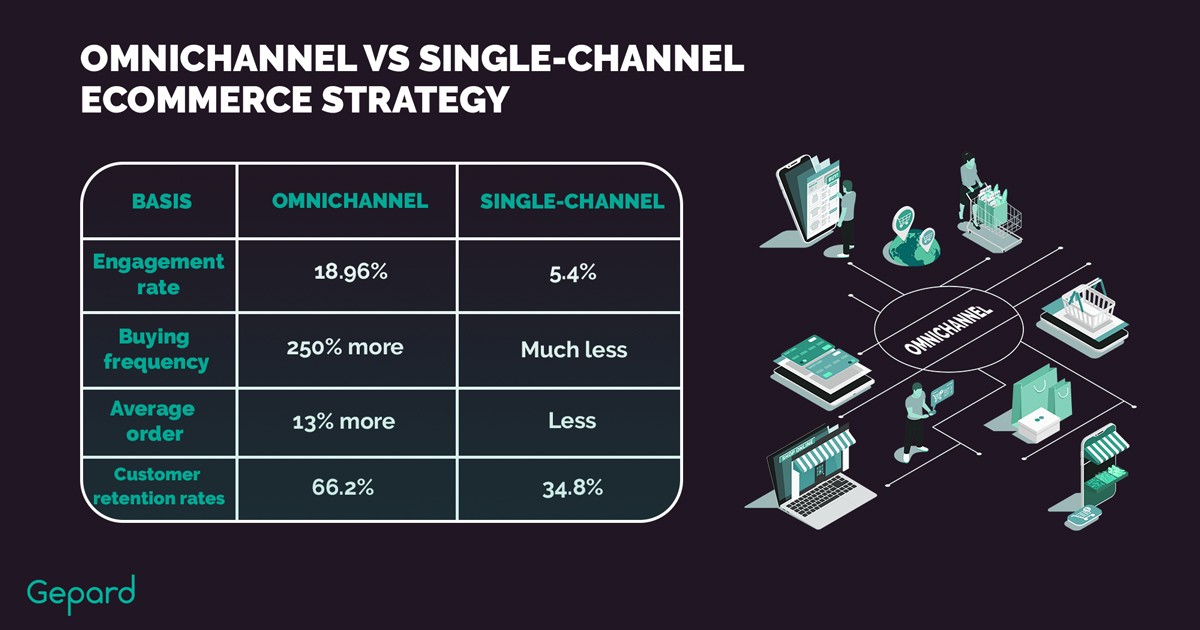Trends for 2022: Enterprise eCommerce Platforms


Enterprise eCommerce Platforms have been on the rise for the last decade - never more so than in the past year, when a record number of retail businesses switched to eCommerce. Online sales became the norm - an imperative, even. This trend points to the importance of enterprise eCommerce platforms. With that in mind, let’s dive into some eCommerce platform statistics, and think about future trends.
What Are Enterprise eCommerce Platforms?
Enterprise eCommerce Platforms are software applications that help you manage and grow your online business. Website administration, marketing, sales, and stock-keeping are more manageable with the right tools. In this day and age, it’s essential to have enterprise eCommerce software, tailored to your specific needs.
TOP Enterprise eCommerce Platforms
1. Adobe Commerce Cloud
Adobe Commerce Cloud, an Adobe product that is among the most used eCommerce platforms. It is easy to use for managing extensive data and is oriented towards large companies. Adobe Commerce Cloud is used by many of the top industry leaders, including Fortune 500 companies.
It offers:
- Easy user interface;
- Large content management;
- AI-driven solutions;
- Useful customer data insights;
- Single platform to manage many workstreams;
- Quick integration with business sales-force.
2. Shopify Plus
Perhaps the most cost-effective enterprise eCommerce platforms out there. More than 1,700,000 businesses across 175 countries choose Shopify Plus.
It offers:
- Fast server speed globally;
- Easy product information integration;
- Improved shopping experience with a 3D view, augmented reality, and product videos;
- Easy management of business complexities;
- Integrated systems: Shopify Plus Partners and Shopify APIs;
- Online academy to get business tips.
3. Magento Enterprise
Magento is also one of the most used eCommerce platforms. With its impressive market growth in 2018, Adobe acquired Magento. Over the past few years, the platform has been gradually integrated into Adobe Commerce Cloud.
It offers:
- Easy site content management and promotion;
- Other Adobe products integration like analytics, experience manager, etc;
- Among single eCommerce platforms that manage many sales channels;
- AI-driven data analysis;
- Easy and quick new tech incorporation.
TOP Enterprise eCommerce Trends 2022
Retail eCommerce sales worldwide are estimated to grow by over $6,388 billion. As per OECD, Covid-19 will have long-term changes and a positive impact on eCommerce.
Enterprise eCommerce search is rising, and so are the profits of online businesses.
Below are the top 5 eCommerce trends of 2022 you must focus on.
1. Omnichannel Strategy: Among Top eCommerce Future Trends
The trend for building and following the omnichannel strategy is on the rise. No matter if you’ve got a brick-and-mortar store, plus an online eCommerce platform you should have an omnichannel strategy to cover all aspects of your business.
When using eCommerce trends to your advantage a few important things need to be kept in mind. Your channel selection must be based on the geography and target market. It is simply because channel usage differs from country to country.
Since this business environment is dynamic, discovering new sales channels is a total must. For example, many companies started using TikTok to engage with a new audience. Always use a sustainable strategy and keep your brand strong.
2. Automation & Reshaping Technology Stack in eCommerce Future Trends
These days a significant number of companies are leveraging their activities into automation. Having an outdated tech stack can obviously hurt your business. But a lot of business owners neglect to what extent this can happen. Tech maintenance cost will not only be a high expense but it will slow your business down. Not to mention that the majority of old systems don’t integrate with modern ones.
With the extensive use of AI, businesses are expanding and controlling their actions. A study found that the AI market will reach over half a trillion US dollars by 2024. This demonstrates that there is a significant advantage for eCommerce platforms.
Automation opportunities in enterprise eCommerce platforms can easily substitute for entire departments and provide them with much-needed help. Customer support, inventory, and order management are among the top areas that should be automated. But less obvious areas such as marketing and sales can and should be automated.

With the right PIM system you can effortlessly syndicate products to varied sales channels. Setting product content syndication via custom API will allow you to enrich product content in one place and automatically distribute it to different platforms.
Not only will you be able to add products in an automated manner and update their product data but also remove them. Having the ability to remove products across multiple platforms in-bulk will save your most valuable asset, time.
3. Customizing Product Options: Top eCommerce Product Trends
Customized and personalized product eCommerce trends are in demand. Let your customers customize the product they choose to buy from you. This strategy will provide you customer satisfaction that leads to customer loyalty.
Product customization simply attracts more customers. User engagement makes the shopping experience a lot more fun and it helps you stand out from the competition. The more product information the user can play around with the better.
4. Voice Search And Virtual Assistants: Advanced eCommerce Search
Optimizing your product content to be a good fit for a voice search is crucial. Underestimating the power of voice search leads you to the loss of customers and prospects. Google data collection shows that the benefits eCommerce platforms get by using voice search are tremendous.
Capgemini Research Institute found in a research that 76% of the businesses had quantifiable benefits from voice assistance. 56% of respondents said the benefit exceeded their expectations and that consumer service cost was reduced by 20%.
Implementing AI-based chatbots to your store simply propels multitasking abilities and adds ease of search for your users. In addition, it helps search engines learn user intent and be self-improving. A strong human-tech relationship is a key to the future, so be a part of it. The most noteworthy examples of virtual assistants are Google Assistant, Siri, Alexa, and Cortana.
5. Customer-Centric Approach By Enterprise eCommerce Platform
Every eCommerce business today tends to please its customers, but not every business is ready to make some efforts to bring this to life.
A customer-centric approach in your business is what people want and notice when it’s not there. The customer-centric approach means having a website that is mobile-friendly or PWA app available. Today internet users are more “tech-savvy” than ever and that means your UI/UX standards need to include the best industry practice. And of course, outstanding customer support will always be a part of the equation.
But all of those things are just one part. You need to have a brand presence in as many channels as possible. Channels where your customers are used to buy their products. eCommerce platforms that go the extra mile in providing unique content and customized products tend to be more successful.
Product information is a part of its presentation and it’s what sells the product. Accurate and high product information gives visitors a sense of ease in making their decision whether to buy a product or not. Making updates to your product information such as titles, descriptions, and cost might seem like a technical part. But the reality is that it’s not.

Enterprise eCommerce Platforms FAQ
What is the main advantage of enterprise eCommerce platforms?
The main advantage is server and software control. Better software control and automation integration in enterprise eCommerce solutions provide business scalability.
What is the best enterprise eCommerce platform?
There is no single choice here, all eCommerce platforms are great solutions. To determine the right one for you, make enterprise eCommerce platforms for comparison with your business needs and goals in mind.
What is a PIM in eCommerce?
PIM (Product Information Management) is a software solution that is a single source of truth to collect and manage all product information.
What’s Next?
As your business grows, you need to have automation to align your business activities with the eCommerce trends: omnichannel strategy, customizing product options, voice search and virtual assistants, customer-centric approach, automation, and staying up to date with your technology. Following these eCommerce trends is a recipe for your business growth. With expansion, product management becomes a tedious task. To execute all of this, a PIM system is an essential addition for an enterprise eCommerce platform.
Here at Gepard we don’t just provide a service, we provide automation solutions that drive sales. Reach out to us if your business is looking to make that next step to automate its eCommerce processes.
Want more like this?
Want more like this?
Insight delivered to your inbox
Keep up to date with our free email. Hand picked whitepapers and posts from our blog, as well as exclusive videos and webinar invitations keep our Users one step ahead.
By clicking 'SIGN UP', you agree to our Terms of Use and Privacy Policy


By clicking 'SIGN UP', you agree to our Terms of Use and Privacy Policy
Other content you may be interested in
Categories
Categories
Categories
Categories

Want more like this?


Want more like this?
Insight delivered to your inbox
Keep up to date with our free email. Hand picked whitepapers and posts from our blog, as well as exclusive videos and webinar invitations keep our Users one step ahead.
By clicking 'SIGN UP', you agree to our Terms of Use and Privacy Policy










